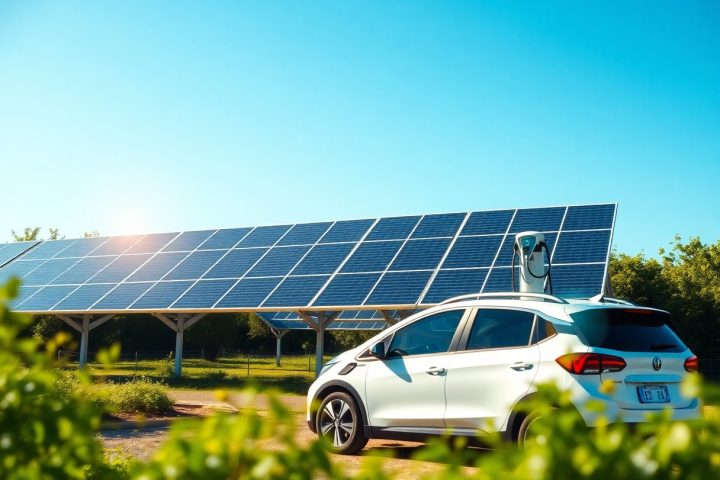Most people are becoming increasingly aware of the environmental benefits of electric vehicles (EVs), but few understand how solar energy can enhance your driving experience. By harnessing the power of the sun, you can charge your EV and reduce your reliance on conventional electricity sources. This blog post will explore the innovative ways solar energy integrates with electric vehicles, highlighting the advantages, technologies, and how you can take advantage of this sustainable synergy to support a greener future.
Overview of Solar Energy
A diverse and abundant source of renewable energy, solar energy harnesses sunlight to generate electricity, offering a sustainable solution to your energy needs. By utilizing photovoltaic cells or solar panels, you can convert sunlight directly into energy, contributing to a cleaner environment while reducing dependence on fossil fuels. This technology has evolved significantly, making it more accessible and efficient for homeowners and businesses alike.
Definition and Basics
To understand solar energy, it’s imperative to know that it involves capturing sunlight and converting it into usable power, primarily through solar panels. These panels contain solar cells made from semiconductor materials that facilitate electricity production when exposed to sunlight. The generated energy can then be used to power homes, businesses, and electric vehicles, significantly reducing energy bills and your carbon footprint.
Benefits of Solar Energy
Against common misconceptions, solar energy offers numerous advantages that extend beyond sustainability. It significantly lowers energy costs, provides energy independence, and enhances property values. You also contribute to environmental conservation by reducing greenhouse gas emissions, making solar energy a win-win for both your wallet and the planet.
And as you tap into the benefits of solar energy, you will find that it allows you to generate your own electricity, which can be particularly advantageous during fluctuations in energy prices. Furthermore, many governments offer incentives such as tax credits and rebates for solar installations, making it even more financially appealing. Investing in solar energy not only supports a green future but also positions you strategically in an evolving energy landscape.
The Evolution of Electric Vehicles
Some might say the journey of electric vehicles (EVs) is rooted in innovation and sustainability. From early prototypes to modern, high-performance models, EV technology has evolved dramatically over the decades. As you explore this evolution, you’ll discover how advances in battery efficiency, charging infrastructure, and renewable energy integration have shaped the current landscape of transportation.
Historical Context
Any discussion on electric vehicles must address their origins, tracing back to the 19th century when the first electric car was developed. Initially overshadowed by gasoline-powered vehicles, EVs resurged in the 21st century as concerns over fossil fuels and climate change prompted a demand for cleaner alternatives. You should appreciate how these historical shifts laid the groundwork for today’s sophisticated EV technology.
Current Trends in EV Technology
Beside advancements in battery technology, current trends in EV technology show a significant move towards sustainable practices, including innovative charging solutions and enhanced vehicle connectivity. As you probe deeper, you will see that manufacturers are increasingly focused on expanding electric vehicle ranges and improving energy efficiency, making EVs more accessible and appealing to a broader audience.
To keep up with these trends, pay attention to the rise of fast-charging networks and the integration of artificial intelligence in EV designs. Not only are automakers investing heavily in research and development, but also you will find growing partnerships with tech companies to enhance the driving experience through smart features. With a shift towards sustainability, you can expect to see EVs with longer ranges, faster charging capabilities, and better compatibility with renewable energy sources, making them an important player in the future of transportation.
Integration of Solar Energy in EVs
There’s a growing synergy between solar energy and electric vehicles (EVs) that offers numerous benefits for drivers. By integrating solar technology directly into EVs and supporting infrastructure, you can enhance your vehicle’s efficiency while reducing dependence on traditional power sources. This combination not only supports sustainable energy but also provides you with a more self-sufficient driving experience.
Solar Panels on Electric Vehicles
Across the automotive industry, manufacturers are increasingly incorporating solar panels into EV designs. This innovative technology allows you to harness sunlight to generate electricity and power auxiliary systems, such as air conditioning and infotainment. By effectively utilizing solar power, you can extend your driving range and reduce the frequency of charging stops.
Solar Charging Stations
Any forward-thinking EV owner should consider the benefits of utilizing solar charging stations. These stations provide clean energy to charge your vehicle, promoting a more sustainable lifestyle while minimizing your carbon footprint. With solar charging, you can power your travels without relying on fossil fuel-generated electricity, making your driving experience even greener.
Further enhancing the appeal of solar charging stations is their ability to provide you with a fully sustainable energy source for your electric vehicle. Many stations are designed to not only charge EVs but also generate surplus energy that can be fed back into the grid. By using solar charging stations, you contribute to a more resilient energy system while enjoying the convenience of sustainable power for your travels. This innovative approach enables you to charge your vehicle with clean energy effortlessly, underscoring the vital role of solar energy in the EV landscape.
Benefits of Using Solar Energy for EVs
Now, incorporating solar energy into your electric vehicle (EV) charging routine brings numerous advantages that enhance both sustainability and efficiency. By harnessing the sun’s power, you’re not only reducing reliance on fossil fuels but also taking advantage of renewable energy sources. This shift not only lowers your carbon footprint but can also lead to significant savings on electricity bills. Integrating solar panels with your EV infrastructure allows you to drive with peace of mind, knowing you’re using clean energy for transportation.
Environmental Impact
Above all, the integration of solar energy in powering your EV significantly contributes to a cleaner environment. By opting for solar, you reduce greenhouse gas emissions, promote air quality, and play a role in mitigating climate change effects. Each mile driven on solar energy translates to less pollution and a safer planet for future generations, making your choice not just a personal benefit but a global responsibility.
Economic Advantages
Below, utilizing solar energy for your EV can lead to noteworthy economic benefits. The initial investment in solar panels may seem substantial, but the long-term savings on fuel and electricity costs can outweigh this expense. By producing your own energy, you can significantly reduce your dependence on grid energy, making your transportation costs more stable and predictable.
A significant economic advantage of relying on solar energy for your EV is the potential for tax credits and rebates that many regions offer for solar installations. In addition to this financial support, you can experience increased home value due to the installation of solar panels. Plus, the collaborative benefits of charging your EV with solar power lead to a more affordable, sustainable lifestyle, proving that greener choices can be financially savvy as well.
Challenges and Limitations
Once again, while solar energy presents a sustainable solution for powering electric vehicles, it does face significant challenges and limitations. Factors such as fluctuating energy production due to weather conditions and the initial investment costs for solar technology can hinder widespread adoption. Additionally, the integration of renewable energy into existing infrastructure may expose inefficiencies and regulatory hurdles that impact both users and manufacturers.
Efficiency Concerns
Behind the promise of solar energy lies the reality of efficiency concerns. Current solar panels convert only a fraction of sunlight into usable electricity, which can be a limiting factor when charging electric vehicles. This inefficiency may necessitate larger panel installations, which can impact space and cost considerations for users.
Infrastructure Barriers
One of the primary challenges you may encounter is the existing infrastructure barriers that impede the integration of solar energy with electric vehicles. Without adequate charging stations equipped with solar technology, your convenience and reliance on solar power can become a significant limitation.
Consequently, the current infrastructure for electric vehicle charging often lacks the capability to support solar integration effectively. Many charging stations are reliant on grid power rather than renewable sources, which diminishes the benefits of solar energy. As the demand for electric vehicles grows, it becomes crucial for cities and companies to invest in upgrading and expanding charging networks to include solar-powered options. This transition not only supports your shift toward sustainable energy but also encourages wider adoption of electric vehicles across the community.
Future Prospects
After the rapid advancements in solar technology and electric vehicles, the future looks promising for the synergy between the two. As sustainable energy becomes a priority, you can expect significant improvements in energy efficiency, charging infrastructure, and the overall integration of solar energy into your vehicle. This evolution will not only reduce your carbon footprint but also lower your operating costs, making electric vehicles powered by solar energy a viable choice for you in the near future.
Innovations on the Horizon
Beside ongoing enhancements in solar panel efficiency, cutting-edge technologies such as integrated solar panels in car roofs and second-life battery systems are on the brink of becoming mainstream. These innovations promise to optimize solar energy utilization, allowing you to charge your electric vehicle more effectively while driving or parked. This means you can enjoy greater autonomy and convenience as solar energy becomes a more dominant player in your driving experience.
Government and Industry Support
Around the globe, governments and industries are recognizing the importance of solar energy for electric vehicles and are investing heavily in research and development. This support manifests in various forms, such as tax incentives, grants for solar infrastructure development, and collaborative partnerships with leading automotive manufacturers. By fostering a renewable energy ecosystem, these initiatives aim to enhance your access to solar-powered electric vehicles and contribute to a greener environment.
Horizon initiatives are increasingly shaping the landscape of solar energy and electric vehicles. With collaborative efforts between governments and the automotive sector, policies supporting renewable energy integration are likely to become more favorable and widespread. This support translates into enhanced solar charging networks that make it easier for you to power your electric vehicle sustainably. As both public and private sectors commit to clean energy, your transition to solar-powered transportation will become smoother, allowing you to play an active role in the movement toward a sustainable future.
Summing Up
Taking this into account, understanding how solar energy powers electric vehicles allows you to appreciate the synergy between renewable energy and sustainable transportation. By harnessing sunlight through solar panels, you can fuel your electric vehicle efficiently and reduce your carbon footprint. As technology advances, integrating solar charging systems into homes and vehicles will become easier, giving you the power to charge your vehicle using clean, renewable energy. This not only benefits your wallet but also contributes to a healthier planet, making your transportation choices better for everyone.




